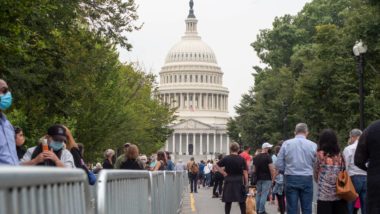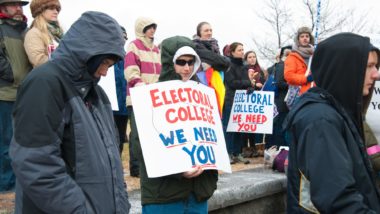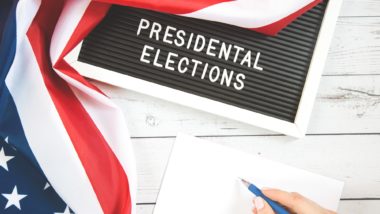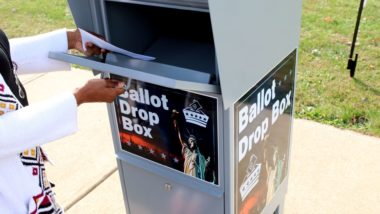
Arizona voters have filed a lawsuit against state officials that challenges signature-gathering methods for government initiatives during the COVID-19 outbreak.
Allegedly, these practices are unsuitable during the current coronavirus pandemic and effectively bar voters from participating in the democratic system.
The Arizona voting signatures lawsuit was filed by Arizonans for Fair Elections, Arizonans Fed Up with Failing Healthcare (Healthcare Rising AZ), and Randi L. Turk.
Turk is a voter who would like to sign petitions for voting initiatives, but cannot do so because of the current coronavirus pandemic. The organizations included in this lawsuit have formed a ballot initiate, and reportedly need signatures for the initiatives.
Providing background for their allegations, the voting activists note that the Arizona Constitution gives the people of Arizona the right to enact or reject legislation through the initiative and referendum process. This power is “equal to the legislative power vested with the Arizona Legislature.”
Have you seen the coronavirus place challenges on voters in your state? Get legal help by clicking here.
Turk and the nonprofits go on to say that the people’s legislative process begins when an organization files an initiative or referendum application with the Secretary. Then, a serial number is obtained, used to create an initiative petition. The AZ voting lawsuit explains that the serial number is necessary to the petition, as well as the petition sheets on which signatures will be collected.
Allegedly, Healthcare Rising AZ and Arizonans for Fair Elections received serial numbers to circulate initiatives — the Stop Surprise Billing and Protect Patients Act and the Fair Elections Act, respectively. After the petitions for these ballots began circulating, news about the coronavirus outbreak reportedly came to light.
To deal with the crisis, Arizona Governor Doug Ducey issued a Declaration of Emergency on March 11, 2020. Since then, he has reportedly given orders and recommendations in an attempt to slow the spread of the virus. Allegedly, these recommendations include social distancing, school closing, attending workplaces only when essential, and staying home when possible.
However, these requirements, restrictions and recommendations fail to address the obstacles to ballot access, says the AZ voting initiatives lawsuit.
Allegedly, neither Arizona nor other states have addressed these issues. Despite the recommendations to stay home, Arizonans still must gather signatures to put forward initiatives, and residents still use petitions to support motions that they approve of, even in the midst of the crisis.

For their part, both Healthcare Rising AZ and Arizonans for Fair Elections say that the coronavirus safety measures have “dramatically burdened signature-gathering efforts,” to the point that the two organizations have suspended their petition efforts.
The Arizona voting lawsuit asserts that effectively, the government’s failure to address the signature-gathering requirement in Arizona’s legislative process when enacting coronavirus protective measures restrains Arizonans’ right to free speech. Subsequently, Turk, Healthcare Rising AZ and Arizonans for Fair Elections assert that these measures are unconstitutional.
The organizations note that statewide initiatives and measures must take into account the requirements of the constitution and statutes, so that residents’ rights are protected.
In other states, voters are grappling with the effects of the coronavirus outbreak on their state elections and political systems. In Wisconsin, voters took issue with their state’s requirement for a witness to sign an absentee ballot, claiming this requirement put undue burden on voters and exposed them to the coronavirus. As in Arizona, Wisconsin residents called these challenges unconstitutional.
In Ohio, voters took issue with the requirement that they must vote by mail, saying that this also disenfranchises voters. Allegedly, the attempt to stop voters from gathering — an attempt to slow the spread of the coronavirus — prevents some voters from voting if they do not have a printer, or have to expose themselves to travel to a place where they can print a ballot.
Turk, Healthcare Rising AZ, and Arizonans for Fair Elections are represented by James E. Barton II, Israel J. Torres and Jaqueline Mendez Soto of Torres Law Group PLLC.
The Arizona Initiative Signature Requirement Lawsuit is Arizonans for Fair Elections (AZAN), et al. v. Katie Hobbs, Arizona Secretary of State, et al., Case No. 2:20-cv-00658-DWL, in the U.S. District Court for the District of Arizona.
Join a Free Coronavirus Class Action Lawsuit Investigation
If you believe your rights were violated in a way that is directly related to the coronavirus pandemic, you may qualify to join this coronavirus class action lawsuit investigation.
Read More Lawsuit & Settlement News:
California Assault & Clergy Sexual Abuse Lawsuit Investigation
Flight Attendants Seek $60 Million in Virgin America Wage Lawsuit
Class Action Rebates | March 2020
Did You Buy Dietary Supplements Based on False Advertising?
ATTORNEY ADVERTISING
Top Class Actions is a Proud Member of the American Bar Association
LEGAL INFORMATION IS NOT LEGAL ADVICE
Top Class Actions Legal Statement
©2008 – 2026 Top Class Actions® LLC
Various Trademarks held by their respective owners
This website is not intended for viewing or usage by European Union citizens.















One thought on Arizona Voters Say COVID-19 Halts Signature Gathering Efforts